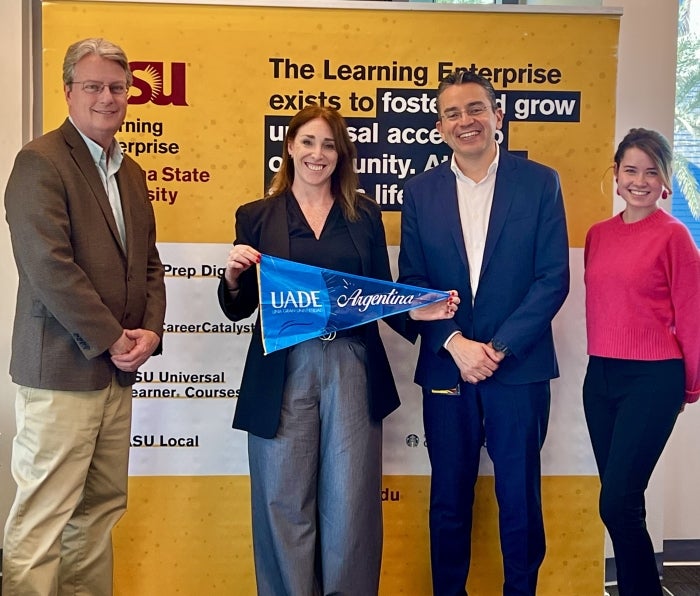ASU brings advanced AI and VR training to over 2,000 faculty in Argentina

The Universidad Argentina de la Empresa campus in Buenos Aires, Argentina. Courtesy photo
How does technology transform our ability to learn? In the evolving landscape of education, artificial intelligence and virtual reality are enabling profound changes.
AI's capability for personalization is having a direct impact on learner success, adapting content to meet individual learning needs. A recent study in the e-learning industry shows an expected 60% increase in retention rates when AI is integrated into learning processes.
VR further shifts the paradigm through learning experiences that enhance engagement and comprehension. These immersive opportunities can make learners up to four times more focused compared with traditional digital experiences — and significantly more confident in applying new skills.
Unfortunately, access to emerging technologies and training is uneven throughout the world. That’s why Arizona State University is committed to expanding opportunity. A new faculty training initiative for Universidad Argentina de la Empresa (UADE) in Argentina focuses on integrating generative AI, VR and other tools and methodologies into teaching practices.
Located in the country’s bustling capital of Buenos Aires, UADE serves 42,000 undergraduate and graduate students. ASU is equipping more than 2,000 UADE faculty with advanced technologies and skills to enhance students’ learning experiences. Since the initiative launched last month, faculty have learned about innovative pedagogical strategies to create and deliver creative and effective e-learning experiences.
"At UADE, we are glad to have ASU supporting our faculty to develop this learning and skills to deliver quality education for our students,” says Paula Catalina Iglesias, head of UADE's Teaching Lab. “We believe that this is possible if our professors are updated and trained with the latest trends in methodology and tools such as AI and virtual reality. The courses have been of paramount importance for our professors’ daily activity, and we can clearly see this in the results of the surveys they answer at the end of each course.”
Empowering faculty to shape the future of learning
The training courses delivered for UADE cover three critical topics: 1) teaching and learning with generative AI, 2) the use of immersive technologies in education, and 3) active learning.
Taken together, the training courses address the specific needs and challenges faced by UADE faculty, such as aligning emerging technologies with tangible learning gains, as well as the local context and education landscape. The courses have been translated into Spanish and are available online through UADE's platform. Upon completion of each course, participants will receive an ASU and UADE certificate.
“Professors ... at UADE have had the opportunity of taking the training courses and rethinking learning experiences to better adapt them to the needs of the new generation of students,” says Ariel Vazquez, UADE professor and director in Human Resources. “These courses are giving us the tools we need to design interactive classes that are centered on the students. I am already using many of these tools in my classrooms, and I have received very positive feedback from students.”
The course on teaching and learning with generative AI leverages ASU's groundbreaking collaboration with OpenAI. By learning to effectively integrate generative AI into the curriculum, UADE faculty are gaining valuable insights into how AI can enhance learning outcomes.
A new model for global learning
“Through this collaboration with UADE, ASU is breaking barriers and reaching learners across the globe,” says Marco Serrato, associate vice president of ASU's Learning Enterprise. "By equipping faculty members with state-of-the-art AI and VR tools, we're empowering them as learners themselves — enabling them to dramatically enhance the experiences for their students. ASU programs like this transcend geographical and linguistic boundaries and are tailored to each learner and setting, ensuring that institutions can effectively serve their diverse student populations.”
This effort has been made possible through collaborative efforts of various units within ASU. Key collaborators include the University Design Institute, Next Lab, the Academic Enterprise, EdPlus and faculty from The College of Liberal Arts and Sciences, who have lent their expertise to the development and implementation of these programs. ASU’s Enterprise Technology will also co-lead a virtual session with UADE leadership to share ASU’s approach on AI for teaching and learning.
For collaboration inquiries and more information on launching similar programs, please contact Faith Dalzell at faith.dalzell@asu.edu.
More University news

ASU tennis partners with ASU PD K-9 officers to keep balls in play
Arizona State University is committed to leading by example in global sustainability, an effort that can be seen throughout the university in unique ways and partnerships.As a reflection of the…

MLB, ASU launch partnership to get players back at bat with their education
Nearly four years after finishing his career as a professional baseball player, Chris Young fulfilled a personal commitment to himself and graduated with a degree in business administration from…

Expanding opportunities for the community and for students the focus of Crow’s state of the university talk
Arizona State University is heading into the second quarter of the century with even more accessibility to students and goals to improve the quality of life in Arizona.The country is facing complex…


